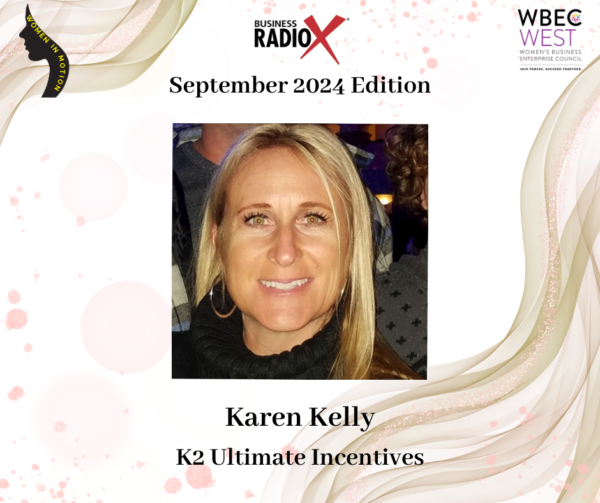
Karen Kelly, founder of K2 Ultimate Incentives, has dedicated her company to enhancing employee engagement through thoughtfully designed incentive programs. In a recent conversation, she shared insights into how K2 Ultimate Incentives serves companies of all sizes, helping them boost productivity, retain employees, and build a culture that values recognition.
The Power of Incentives for All Company Sizes
Karen stresses that incentive programs are not exclusive to large corporations; smaller businesses can benefit greatly from them, too. “Incentives stimulate greater output and can change behaviors,” she says. For smaller companies, effective incentive programs can be crafted within budget constraints to suit specific organizational needs, boosting morale and productivity alike. Large enterprises, on the other hand, may have more complex requirements, but the foundational principles remain the same.
Best Practices for Building an Effective Incentive Program
According to Karen, regardless of size, building a successful incentive program begins with clear objectives. “Define what the goal is—whether it’s boosting productivity, improving retention, or increasing employee morale,” she advises. Knowing your team’s motivations is equally critical; an incentive program that doesn’t resonate with employees may fall flat. Programs should also set clear criteria and be communicated with transparency, ensuring that everyone understands the goals and rewards.
Karen advocates for piloting programs during key events, such as holidays or company-wide celebrations. Piloting allows organizations to gather feedback and adjust based on real results, ensuring that the final program is both effective and well-received.
Addressing Generational Differences and Modern Needs
Modern incentive programs should cater to today’s multigenerational workforce. Millennials and Gen Z employees, who thrive on instant recognition, will make up 60% of the workforce by 2025, making regular acknowledgment more important than ever. Karen notes, “Long gone are the days of quarterly or yearly rewards—these should now be more frequent, with regular celebrations to keep employees motivated.”
Incentives don’t always have to be financial. For smaller businesses, Karen suggests alternatives such as early dismissal, flexible work arrangements, or public recognition. “Social recognition can go a long way,” she adds, encouraging organizations to be creative in offering meaningful rewards.
Enterprise-Level Strategies: Leveraging Data and Technology
Larger organizations can benefit from more segmented, data-driven approaches. Using analytics to track which incentives resonate most with different departments helps in tailoring programs to the unique motivations within teams. Additionally, technology integration allows for scalable solutions, such as point-based systems or digital recognition platforms, that keep employees engaged across departments and locations.
Karen emphasizes the need for tiered awards in larger enterprises, giving different levels of recognition to avoid the pitfall of having only top performers win repeatedly. This helps keep all employees engaged, fostering a culture where everyone has the opportunity to be rewarded.
Making Recognition Accessible and Environmentally Friendly
One of the recent challenges Karen faced was helping a company transition from physical gift cards to environmentally friendly alternatives. Her team introduced a system that allows employees to receive instant, digital rewards via text, combining the tangible impact of on-the-spot recognition with a commitment to sustainability.
Onboarding with K2 Ultimate Incentives
When working with a new client, K2 Ultimate Incentives begins with a thorough planning process. Karen explains, “We start by defining key metrics, objectives, and program design, then proceed to communicate the plan, roll out the initial stages, and gather feedback for ongoing improvement.” This strategic approach ensures that the program is aligned with the client’s needs from the start.
Empowering Women Entrepreneurs Through WBEC-West
Karen’s journey with K2 Ultimate Incentives is rooted in her purpose to make a difference. She joined the WBEC-West community after a client suggested she pursue women’s business certification, seeing value in strengthening her company and enhancing credibility. Today, Karen is a certified woman-owned business, furthering her mission to impact her clients and community positively.
Connect with K2 Ultimate Incentives
K2 Ultimate Incentives offers comprehensive incentive solutions that empower organizations to achieve their goals. To connect with Karen Kelly and learn more, visit www.k2ultimateincentives.com, find her on LinkedIn, or reach out via email at karen@k2ultimateincentives.com. Listen to her full journey here: https://businessradiox.com/podcast/women-in-motion/incentive-programs/
About Women’s Business Enterprise Council-West (WBEC-West)
WBEC-West is a regional partner of the Women’s Business Enterprise National Council (WBENC), a coalition of corporations, WBEs, and regionally focused women’s business organizations. As an affiliate organization, WBEC-West implements the certification standards of WBENC throughout Arizona, Colorado, Southern California, Utah, Wyoming, Nevada, Hawaii, and Guam. WBENC is the largest certifier of women’s business enterprises in the U.S. and a leading advocate for women business owners, leaders, and entrepreneurs. WBENC certification is nationally recognized and accepted by more than 10,000 major corporations. We also support corporations in their efforts to include WBENC Certified WBEs in their supply chain.





